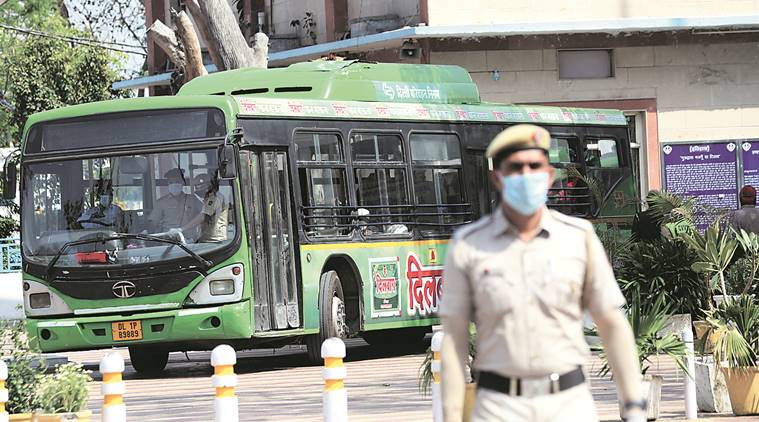 A DTC bus ferried workers from the gurdwara. (Express photo by Tashi Tobgyal)
A DTC bus ferried workers from the gurdwara. (Express photo by Tashi Tobgyal)
The Bus and Car Operators Confederation of India (BOCI) has written to Prime Minister Narendra Modi, requesting a “bailout plan” for bus and car operators in the country to survive the “once-in-a-lifetime crisis” put forth by COVID-19.
The confederation, in a letter written by BOCI president Prasanna Patwardhan, sought toll exemptions for a period of three months, moratoriums on loan EMIs including waiver of interest during the period, assistance in payment of salaries of employees for three months, deferring collection of other taxes from vehicle operators, and no increase in insurance premia for the ongoing financial year.
“Due to the lockdown situation, there are no revenues and income. Also, due to severe competition in almost all markets, very few companies have a sufficient buffer to survive such unprecedented circumstances. Under this situation, without appropriate support from the government, businesses will be forced to lay off thousands of people in order to survive…The government should seriously consider paying the salaries of people registered for PT (professional tax), ESI (Employee State Insurance) and PF (Provident Fund) or under any other government scheme across companies for a period of three months. Irrespective of the size of the organisations,” wrote Patwardhan.
The letter said that similarly, toll tax should be waived of for a minimum of three months after the lockdown period is over by giving an extension for the corresponding period to toll operators. Banks can support these toll operators by providing them enough liquidity to sustain for the next six months and recover it going forward. “This is also a good opportunity to concert all toll plazas into “smart lanes” which will save thousands of crores of rupees in the transport sector and in turn and will also save fuel, which is wasted in queues caused by manual collection,” the letter added.
The BOCI also requested that banks should be instructed to reschedule loans by giving at least six months moratorium period to all their customers with a certain credit rating, track records. “Although rescheduling as declared by RBI will help businesses by deferring cash flows, it will not be fair in my opinion for banks to continue booking interest for even the moratorium period. They should waive off the interest for, at least, a period of three months as a support to customers. The banks should be instructed to make available additional working capital at minimal interest rates,” stated the letter.
As per the confederation, only deferring tax collection from the vehicle owners won’t be enough relief. “I believe that a tax waiver (maybe six months) is required to ease businesses from the burden of having to worry about taxation at a point where businesses sustenance itself has become an issue. The Central Government may issue advisory to all state governments to consider waiver of Motor Vehicle and Property taxes for at least a period of three months,” Patwardhan wrote.
As per Patwardhan, since business losses are not insured, many businesses across India will not be able to recover losses made anytime soon in the future, since all vehicles are assets are lying idle during the lockdown period. “To compensate some of the losses, insurance coverage should be given for the entire lockdown period plus 15 days, without taking any additional premium across category of assets, vehicles should not be increased for at least the financial year 2020-21,” he wrote in the letter.